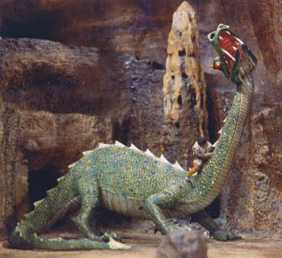Every now & then a movie comes along that delights audiences so much, & so transcends all the agendas that tend to cloud our enjoyment, that even the most curmudgeonly critics & buffs are disarmed, & just say “go see it.”
The Artist is one of these movies. There are detractors out there somewhere, no doubt, but I haven’t heard from them yet, & I’m not one of them. Go see it.
Written & directed by the Frenchman Michel Hazanavicius,
The Artist is a black-&-white & (mostly) silent romantic comedy-drama. The title character is a silent-movie star, George Valentin (Jean Dujardin), a dashing, romantic hero in the vein of Douglas Fairbanks or John Gilbert. As the film begins it’s 1927 & he’s in his glory, seeming to radiate glamour & bonhomie, onscreen & off, from his blazing smile. He basks in the love of his fans & coworkers—the occasional outraged leading lady excepted. The stern face of his wife (Penelope Ann Miller) at the breakfast table, however, is like a dark cloud on George’s horizon.
The storm, of course, hits two years later, in the form of the talkies. George’s studio boss (John Goodman) plans to get current with the new technology, but George is sure sound is a fad that will blow over, & he sinks his fortune into producing a silent vehicle for himself. It’s a flop, & George, attended by his faithful chauffeur (James Cromwell) & his resourceful little dog (Uggie), is on his way to the gutter.
Parallel to George’s decline is the rise of Peppy Miller (Berenice Bejo, Hazanavicius' partner), a delectable young actress whose career gets a lift from George when she’s a dancing extra in one of his films, & who rides it all the way to stardom. She’d love to help revive George’s career, & his romantic life, but he’s too proud.
The Artist is not the first movie to use the birth of the talkies as a backdrop—the peerless
Singin’ in the Rain is the best-known of the others. Nor is it the first latter-day film to employ the faux-silent-movie conceit; others include
Silent Movie, the enjoyable Mel Brooks effort of 1976,
Charles Lane’s neglected 1989 slapstick opus Sidewalk Stories, & Guy Maddin’s intoxicating 2002 ballet film
Dracula: Pages From a Virgin’s Diary. But despite the lightweight story & the lovingly recreated look,
The Artist somehow seems more like a reclamation of the silent cinema’s strengths than like a nostalgic gimmick. It even employs sound at a couple of points, briefly but brilliantly. It’s vital & gutsy, & we respond to it as a contemporary movie.
In no small part, this is due to the actors. For all the skill that Hazanavicius displays in his direction, for all the beauty & authenticity of Guillaume Schiffmann’s cinematography or the sly score by Ludovic Bource, the real punch in
The Artist comes from the performances. Hazanavicius was shrewd, maybe, to have made George such a maddening, exasperatingly prideful person—this offsets the almost comical likability of Dujardin, with his ebullient smile.
Bejo captures silent insouciance perfectly, & she has a sweet moment, interacting with George’s jacket, that’s as sexy as anything I’ve seen in movies in a while. Cromwell is spot-on, & the supporting cast is full of name players from English-speaking movies in minor roles, but Uggie, as George’s long-suffering canine costar & pet, is the only presence in the film more irresistible than Dujardin.




















